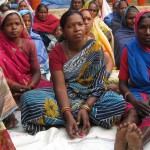Author Megha Bahree travels extensively through India reporting on the country’s transformation from a traditional agrarian economy to an industrial one. She is currently a Staff Writer at Forbes magazine, and blogs at megha.me.
India is the world’s seventh largest consumer of electricity and is set to overtake countries like Canada and Germany as its economy grows. Last year GDP grew 6.5%, the 13th fastest in the world according to the CIA factbook. But this growth comes at a cost. Take for example, the village of Khamaria in the state of Chhattisgarh in eastern India.
On the one hand are villagers who only know an agrarian way of life, and on the other is Jindal Steel & Power, one of India’s luminary companies, which, through its steel plant, coalmines and a 1000MW thermal power plant is feeding the country’s energy and industrial demands. Naveen Jindal, the company’s executive chairman and a Member of Parliament, is adding on a $2.4 billion, 2400MW coal-fired power plant in the same region. (His mother, Savitri, chairs the O.P. Jindal group and is ranked the 44th richest billionaire by Forbes with an estimated net worth of $12.2 billion.)
While the Jindals rake in their billions, I saw firsthand the devastation wreaked on the area. Driving through this thickly forested area, the green gives way to black – the soot on the leaves and shrubs is like rank topsoil.
the soot on the leaves and shrubs is like rank topsoil.
Residents say that when they voiced their protest in a sanctioned public forum, they were beaten by police; some hospitalized.
 Two farmers I spoke with – Krishna Lal Sao and Raghunath Choudhary – collectively lost 7.5 acres that was the source of their livelihood for the expansion of this power plant. Years of filing petitions with the courts or the police have resulted in nothing but heartache. Sao has now taken a loan and started a stationery store to send his four kids to school while Choudhary, who is forced to farm someone else’s land, blames both the suicide of his younger son and his wife’s recent fatal heart attack on stressful circumstances caused by Jindal.
Two farmers I spoke with – Krishna Lal Sao and Raghunath Choudhary – collectively lost 7.5 acres that was the source of their livelihood for the expansion of this power plant. Years of filing petitions with the courts or the police have resulted in nothing but heartache. Sao has now taken a loan and started a stationery store to send his four kids to school while Choudhary, who is forced to farm someone else’s land, blames both the suicide of his younger son and his wife’s recent fatal heart attack on stressful circumstances caused by Jindal.
To be fair to the company, I asked if this clash (one of several across the country between not just Jindal, but other companies as well) was a part of the transition from an agragrian to an industrial economy and if the company could help ease the transition either through better compensation (which is much below the market rate at present) or via job training that is more than someone just sweeping floors. But Naveen Jindal responded,“There is some initial resistance as villagers are obviously aspiring to obtain maximum prices for their land and other benefits.”
It doesn’t look like this friction will be over any time soon. Shahid Hasan, associate director at the The Energy and Resources Institute in New Delhi says that while the government is in process of adding on more electricity generation capacity, the demand continues to grow and will outstrip the production. “There is no end to this,” he says.
To read more: